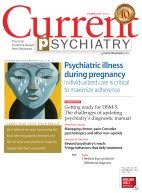Susan Hatters Friedman, MD
Senior instructor, Departments of psychiatry and pediatrics, Case Western Reserve University School of Medicine, Cleveland, OH
Phillip J. Resnick, MD
Professor, Department of psychiatry, Case Western Reserve University School of Medicine, Cleveland, OH
Miriam B. Rosenthal, MD
Associate professor emeriti, Departments of psychiatry and obstetrics and gynecology, Case Western Reserve University School of Medicine, Cleveland, OH
Postpartum psychosis (PPP) presents dramatically days to weeks after delivery, with wide-ranging symptoms that can include dysphoric mania and delirium. Because untreated PPP has an estimated 4% risk of infanticide (murder of the infant in the first year of life), and a 5% risk of suicide, psychiatric hospitalization usually is required to protect the mother and her baby.
The diagnosis may be missed, however, because postpartum psychotic symptoms wax and wane and suspiciousness or poor insight cause some women—such as Andrea Yates—to hide their delusional thinking from their families. This article discusses the risk factors, prevention, and treatment of PPP, including a review of:
infanticide and suicide risks in the postpartum period
increased susceptibility to PPP in women with bipolar disorder and other psychiatric disorders
hospitalization for support and safety of the mother and her infant.
Comment on this article
Email the editor


No comments:
Post a Comment